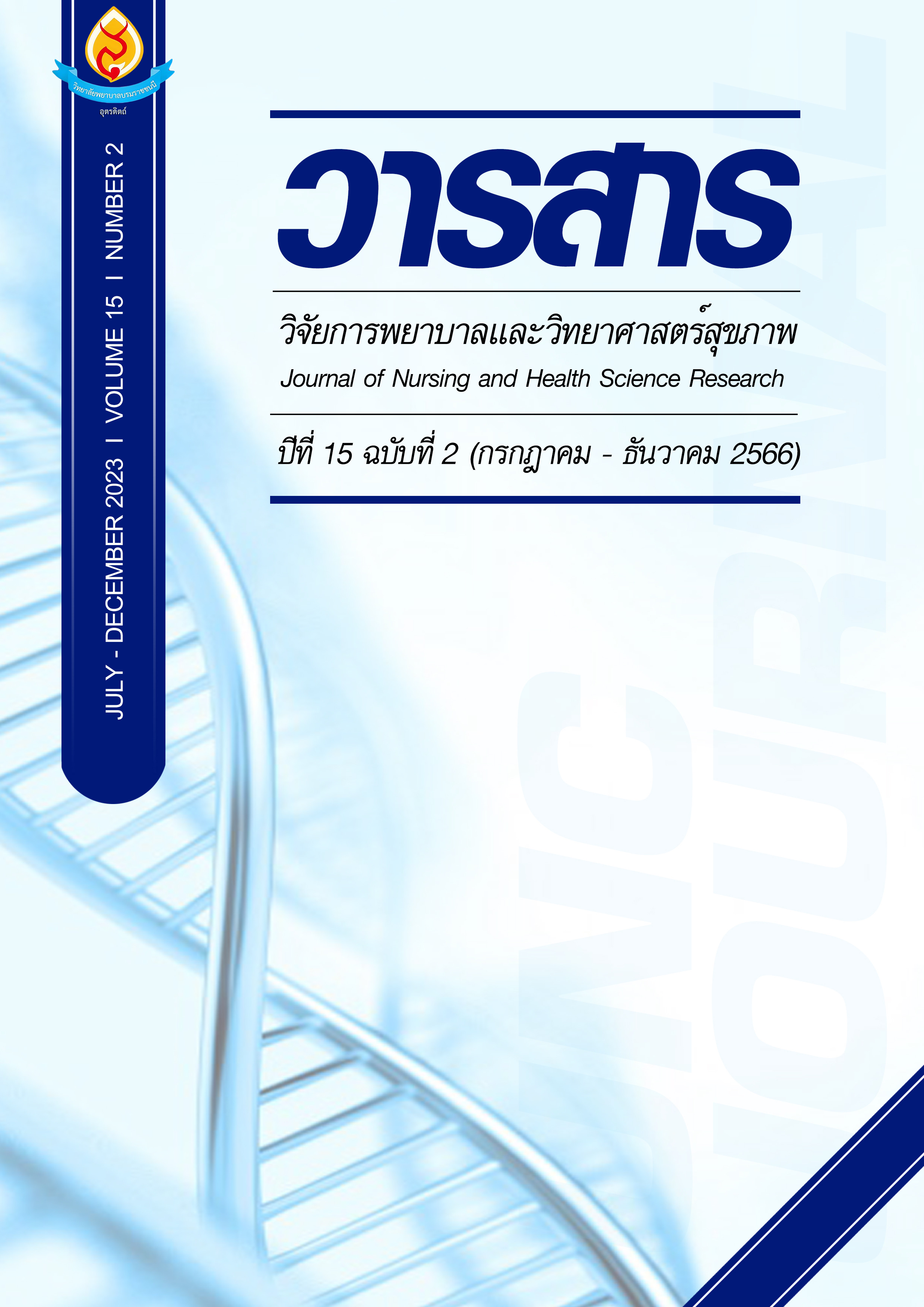ปัจจัยที่ส่งผลต่อการปรับตัวของนักศึกษาสถาบันอุดมศึกษาแห่งหนึ่ง ในช่วงการระบาดของโรคโควิด 19
Main Article Content
บทคัดย่อ
การวิจัยเชิงพรรณนาแบบตัดขวางนี้มีวัตถุประสงค์เพื่อศึกษาการปรับตัวและหาปัจจัยที่มีผลต่อการปรับตัวของนักศึกษา กลุ่มตัวอย่างคือนักศึกษาของมหาวิทยาลัยเทคโนโลยีราชมงคลตะวันออก วิทยาเขตบางพระ ที่ลงทะเบียนเรียนในช่วงปีการศึกษา 2564 ถึง 2565 ด้วยการสุ่มอย่างง่ายโดยใช้คอมพิวเตอร์ จำนวน 129 คน เก็บรวบรวมข้อมูลโดยใช้แบบสอบถามการปรับตัวในสถานการณ์โควิด 19 แบบสอบถามความรูเรื่องโรคโควิด-19 แบบสอบถามการสนับสนุนทางสังคมแบบพหุมิติ แบบสอบถามความเข้มแข็งทางใจ และระยะเวลาในการรับรู้ข่าวสารเกี่ยวกับโรคโควิด 19 วิเคราะห์ข้อมูลโดยหาค่าเฉลี่ย ร้อยละ ค่าเบี่ยงเบนมาตรฐาน และวิเคราะห์ปัจจัยที่มีผลต่อการปรับตัวของนักศึกษาด้วยสมการการถดถอยพหุคูณ (Multiple Regression Analysis) และนำตัวแปรเข้าด้วยวิธี Enter
ผลการวิจัยพบว่านักศึกษาของมหาวิทยาลัยเทคโนโลยีราชมงคลตะวันออก วิทยาเขตบางพระ โดยภาพรวมมีการปรับตัวในช่วงการระบาดของโรคโควิด 19 มีค่าเฉลี่ยเท่ากับ 3.88 อยู่ในระดับมาก (SD= .545) ความรูเรื่องโรคโควิด-19 มีค่าเฉลี่ยเท่ากับ 9.18 อยู่ในระดับมาก (SD=1.558) การสนับสนุนทางสังคมแบบพหุมิติ มีค่าเฉลี่ยเท่ากับ 4.65 อยู่ในระดับค่อนข้างมาก (SD= 1.656) ความเข้มแข็งทางใจ มีค่าเฉลี่ยเท่ากับ 2.89 อยู่ในระดับปานกลาง (SD= .470) มีการใช้เวลาในการรับรู้ข่าวสารเกี่ยวกับโรคโควิด 19 เฉลี่ย 50.49 นาทีต่อวัน ปัจจัยที่ส่งผลต่อการปรับตัวของนักศึกษามหาวิทยาลัยเทคโนโลยีราชมงคลตะวันออก วิทยาเขตบางพระที่สามารถ พยากรณ์การปรับตัวของนักศึกษา ได้แก่ ปัจจัยความรู้เกี่ยวกับโรคโควิด-19 ของนักศึกษา (β= .261) ปัจจัยการสนับสนุนทางสังคมแบบพหุมิติ (β= .219) และปัจจัยความเข้มแข็งทางใจ (β= -.179) สามารถพยากรณ์การปรับตัวของนักศึกษามหาวิทยาลัยเทคโนโลยีราชมงคลตะวันออก วิทยาเขตบางพระ ได้ร้อยละ 15.3 (Adjust R2 = .153, p< .001)
จากผลการศึกษามีข้อเสนอแนะว่าสถาบันควรจัดกิจกรรมในการส่งเสริมความรู้เกี่ยวกับโควิด 19 และสร้างความเข้าใจในการรับรู้ และการสนับสนุนทางสังคมทั้งจากเพื่อน อาจารย์ และครอบครัวคนใกล้ชิดให้เพิ่มมากขึ้นเพื่อส่งเสริมนักศึกษาให้สามารถปรับตัวได้อย่างเหมาะสมในทุก ๆ ด้าน
Article Details

อนุญาตภายใต้เงื่อนไข Creative Commons Attribution-NonCommercial-NoDerivatives 4.0 International License.
บทความหรือข้อคิดเห็นใดใดที่ปรากฏในวารสารวิจัยการพยาบาลและวิทยาศาสตร์สุขภาพ เป็นวรรณกรรมของผู้เขียน ซึ่งบรรณาธิการหรือสมาคมศิษย์เก่า ไม่จำเป็นต้องเห็นด้วย และบทความที่ได้รับการตีพิมพ์เผยแพร่ถือเป็นลิขสิทธิ์ของวารสารวิจัยการพยาบาลและวิทยาศาสตร์สุขภาพ
เอกสารอ้างอิง
Ahmad, A. & Omar, Z. (2012). Effects of informal work-family support on job performance: mediating roles of work-family conflict and job satisfaction. The Journal of International Management Studies, 7(2), 202-206
Ayele, A. (2018). Assessing major adjustment problems of first year students in Ethiopia, Wolaita Sodo University. American Journal of Educational Research, 6(9), 1326-1332.
Baker,R.W. & Siryk, B. (1984). Measuring adjustment to college. Journal of Counseling Psychology, 31(2), 179-189.
Boonyamalik, P. (2005). Epidemiology of adolescent suicidal ideation: Roles of perceived life stress, depressive symptoms, and substance use (Thailand). Unpublished Dissertation, Johns Hopkins University, US.
Chareonrook, D. (2023). The adaptability of undergraduate students of Rungsit university during the COVID 19 Pandemic. Journal of Communication of Arts Review, 27(1), 132 – 140. (in Thai).
Charnbhumidol, P., Kraiwanich, S. & Kraiwanit, T. (2020). Learning method for the new normal in Thailand. Retrieved from https://www.researchgate.net/publication/344867780
Chotphitayasunond, V. & Dharmmapeera, P. (2021). An investigation of the effect of pandemic fatigue on mental health problems under the COVID-19 pandemic: university student. Department of Mental Health, Ministry of Public Health. accessed August 5, 2023. Retrieved from https://dmh-elibrary.org/items/show/527 (in Thai).
Cobb, S. (1976). Social support as a moderator of life stress. Psychosomatic Medicine, 38, 300-313.
Department of Mental Health. (2019). Creative manual: teenage mental health strong together. Bangkok, Beyond Publishing. (in Thai).
Faul, F., Buchner, A., Erdfelder, E. & Lang, A.-G. (1992 - 2020). Statistical power analyses using G*Power 3.1: Tests for correlation and regression analyses. Behavior Research Methods, 41, 1149-1160.
Guilford, J. P. & Benjamin, F. (1981). Fundamental statistics in psychology and education. New York, McGraw-Hill.
Jumroonrojana, K. (2020). 5 ways to revive your mind through the COVID-19 crisis. Retrieved from https://www.rama.mahidol.ac.th/ramachannel/article/covid-19/. (in Thai).
Lertsakornsiri, M., Narumitlert, J. & Samutpradit, K. (2021). Factors effecting on learning behaviors with students’ online learning in Saint Louis College from COVID-19 situation. Journal of Health and Health Management, 7(1), 13 – 27. (in Thai).
Ministry of Public Health. (2020). Public health officials' guide to emergency response in the event of an outbreak. Coronavirus disease 2019 in Thailand. Retrieved from https://www.skho.moph.go.th/eoc /?wpdmpro/ (in Thai).
Ministry of Public Health. (2021). New strain of coronavirus disease: report on the situation of infected people - Department of Disease Control. Retrieved from https://ddc.moph.go.th/viralpneumonia/intro.php (in Thai).
Noor, S., Tajik, O. & Golzar, J. (2022). Simple random sampling. International Journal of Education & Language Studies, 1(2), 78-82.
Resilient Educator. (2013). Five skills online teachers need for classroom instruction. Retrieved from https://resilienteducator.com/classroom-resources/5-skills-online-teachers-need-for-classroom-instruction/
Rogers, C.R. (1967). Client-centered therapy. Boston Houghton Miffin.
Sachin, K., Heangudomsub, P. & Vatanasin, D. (2019). Factors influencing mental health status of professional nursesin a private hospital. Journal of Health and Nursing Research 35(3), 98 – 111. (in Thai).
Sansupa, K., Kongkranphan, U., Sucaromana, U. & Nantasen, P. (2020). The Adjustment of Undergraduate Student in Pandemic Covid-19. Journal of MCU Humanities Review, 6(2), 83 – 97. (in Thai).
Senate Education Committee. (2020). Research report on urgent policy recommendations. Concerning educational management during the outbreak of coronavirus disease 2019 (COVID-19) that is appropriate for Thai society. Newsletter, 21 (2020). (in Thai).
Suwannakhot, N., Wattananarong, A. & Sripairot, N. (2013). Adjustment of the first year undergraduate students at Naresuan university. Journal of Educational Research Faculty of Education, Srinakharinwirot University, 7(2), 134 – 141. (in Thai).
Techawathakul, L. (2012). Factors affecting work adjustment of personnel in Catholic Schools under the Bangkok archdiocese in education region 1. Master of Arts Program in Community Psychology, Department of Psychology and Guidance, Graduate School, Silpakorn University.
Thammasat University, (2021). People's behavior has changed during COVID-19. Retrieved from https://tu.ac.th/thammasat-210164-tbs-research-behavior-people-during-covid-19
Thanoi, W., Kasornsri, S., Thavorn, T. & Vongsirimas, N. (2018). Factors influencing mindfulness among undergraduate students. The Journal of Psychiatric Nursing and Mental Health, 32(2), 130 -144. (in Thai).
Thomas, L. (2022). Simple random sampling | definition, steps & examples. Scribbr. Retrieved from https://www.scribbr.com/methodology/simple-random-sampling/
Thongkaew, T. (2020). Educational design in the new normal: the impact of the spread COVID-19 outbreak. Journal of Teacher Professional Development, 1(2), 1-10. (in Thai).
UNESCO. (2020). COVID-19 educational disruption and response. Retrieved from https://en.unesco.org/themes/education-emergencies/coronavirus-school-closures
Ursachi, G., Horodnic, I. A. & Zait, A. (2015). How reliable are measurement scales? external factors with indirect influence on reliability estimators. Procedia Economics and Finance. 20, 679-686.
World Health Organization. (2021). Coronavirus disease (COVID-19) pandemic: Situation report. Retrieved from https://www.who.int/emergencies/diseases/novel-coronavirus-2019
World Health Organization. (2023). Coronavirus disease (COVID-19) questions and answers (general). Retrieved from https://www.who.int/thailand/emergencies/novel-coronavirus-2019/q-a-on-covid-19/q-a-on-covid-19-general
Zamira, H. (2020). The impact of COVID-19 on higher education: A study of interaction among students’ mental health, attitudes toward online learning, study skills, and changes in students’ life. Retrieved from https://www.researchgate-net/publication/ 341599684.
Zimet, G., Dahlem, W. N., Zimet, G. S. & Farley, G. K. (1988). The multidimensional scale of perceived social support. Journal of Personality Assessment, 52(1), 30-41.


